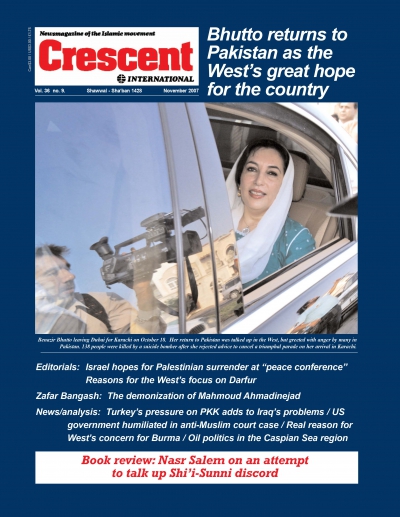Crescent International Vol. 36, No. 9
Newsmagazine of the Islamic movement
Iqbal Siddiqui
Shawwal, 1428 2007-11


Returning to Pakistan on October 18, Benazir Bhutto discovered how radically the country has changed in the eight years she was away “languishing” in self-imposed exile. Heading a political procession—in reality a circus of rented crowds—from the airport to the mausoleum of the country’s founder, Muhammad Ali Jinnah, Benazir’s procession was attacked by two suicide-bombers who left 140 people dead and more than 500 injured.

In recent years, the long story of the Palestinian struggle has been punctuated by meetings, conferences and summits of various kinds between Israeli and Palestinian officials, usually mediated by international leaders or institutions. Yet there was a time, only a few years ago, when it was assumed that everything could be sorted out if only the two sides could be persuaded to sit together and talk. Then, the great object of all the politicking was to persuade the leaders of the two sides to come together and, it was assumed, listen to what each other had to say.

Since Israel is the new temple and zionism the new religion of the West, any mention of eliminating zionism or the zionist regime inPalestine is immediately branded as anti-Semitism and a threat to world peace. This is especially true of President Mahmoud Ahmadinejad of Iran, whose speech on October 26, 2005, has been so widely misquoted that promoting the lies has effectively become official policy in many Western countries. Even the United Nations Security Council was duped into issuing a statement condemning Iran for calling for Israel’s “destruction”.

On 20 March, 2003, the government of the USA sent its full range of armed forces intoIraq, obliterating its infrastructure and smashing its civil life like a lion devouring a rabbit. Since then almost one million men, women and children have been killed, and uncounted others have been wounded. No one wants to say so, but consequently the Iraqi people are teetering on the brink.

Many people reading the recent news from Darfur may be confused. On October 25, just days before peace talks on the conflict in Darfur were due to begin in Libya, anti-government rebels in Darfur were reported to have attacked oil installations in the neighbouring region of Kardofan, kidnapping two foreigners and warning other foreign oil workers that they had a week to leave the country or they would face similar attacks. The start of the talks in Sirte were then delayed because rebel groups refused to take part.

The already complicated and volatile situation in Iraq may be about to deteriorate further. After months of escalating tensions along the Iraq-Turkey border, in October 17 the Turkish parliament passed a motion submitted by the government of prime minister Recep Tayyip Erdogan that permits military strikes on Iraq. The motion, the first of its kind since Turkey’s invasion of northern Cyprus in 1974, was approved by an overwhelming majority of 507 in the 550-member Turkish grand national assembly.

The US followed through on its threats to impose severe economic sanctions on Iranian institutions on October 25, when it announced unilateral measures against the Revolutionary Guard Corps, three major Iranian banks, and more than 20 Iranian companies. However, the fact that it imposed the sanctions unilaterally, instead of via the UN, as initially threatened, indicates caution about the US’s belligerence even among allies that are supporting it publicly, and there was outspoken criticism of the US from Russian president Victor Putin during a state visit to Iran.

The US government suffered a stunning defeat on October 21 when a court in Dallas, Texas, refused to convict officials of the Holy Land Foundation (HLF) charity despite a long government campaign against them. The HLF was shut down in December 2001 amid allegations that it was supporting terrorism and had links with Hamas, the Islamic resistance movement in Palestine.

It was in December 2006 that the Ethiopian army – with the US’s military and financial support – invaded Somalia and paved the way for the expulsion of the Union of Islamic Courts (UIC) and its replacement by the clan-based interim government (IG). Now it is once again pouring its troops into Mogadishu, the capital of Somalia, to prop up the IG (which has foundered as a result of a dispute between its president, Abdullahi Yusuf Ahmed, and prime minister Ali Mohamed Ghedi) and to prevent the UIC from seizing power.

One can imagine the furore that would erupt if a Muslim group were to launch a "Judeo-Christian Fascism Awareness Week" on American university campuses and then circulate a petition asking people to sign; those refusing to do so would be accused of supporting ‘Judeo-Christian Fascism’. Something similar took place for a week at nearly 200 American university campuses from October 24 but Muslims, not Jews or Christians, were the targets of this vicious campaign.

The summit-meeting of the five Caspian Sea countries in Iran on October 17, and the suspension of the European Union’s sanctions on Uzbekistan have focused attention on how the US, Russia, the EU and China are vying with each other for the rich energy resources of the Central Asian states in the region.

The Shia Revival: How Conflicts within Islam Will Shape the Future by Vali Nasr. Pub: W. W. Norton & Co., New York, 2006. Hbk: US $25.95.
